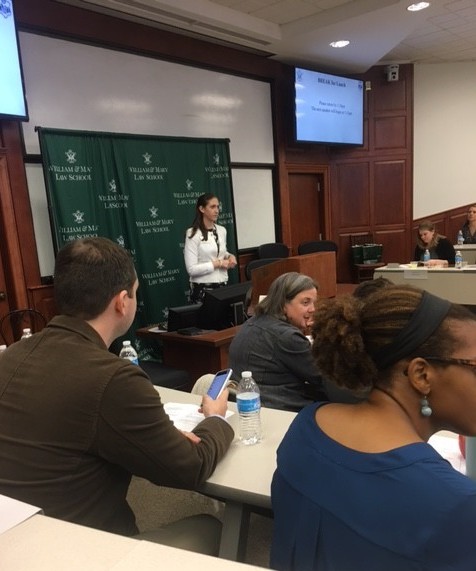Jan. 24, law students, community members and undergraduate students gathered at the Marshall-Wythe School of Law to attend the Journal of Women and Law Symposium on combating human trafficking through law and policy.
The JOWL Symposium was broken up into morning and afternoon sessions and consisted of speakers and panels on a range of subtopics under the umbrella of human trafficking.
Examples included Rachel Marshall’s presentation, “A Critical Analysis of Laws Regarding Sex Work,” and Kate Price and Keith Bentele’s presentation, “Voting to End Vulnerability: Understanding the Recent Proliferation of State-Level Child Sex Trafficking Legislation.”
Speaker Katie Soltis, an immigration legal fellow for the immigration nonprofit organization Ayuda, said that human trafficking is divided into two categories: labor trafficking and sex trafficking.
She said that labor trafficking often gets overlooked, although it is more widespread than sex trafficking.
Soltis said that data on human trafficking is hard to collect because of the nature of the crime, but estimates say that 21 million people around the world are victims of forced labor, compared with 4.5 million who are victims of sexual exploitation.
Michelle Weinbaum J.D. ’17 planned the symposium and said that she wanted attendees to come away with a greater appreciation for the complexity and controversy surrounding the issue of human trafficking. She hoped to do this by discussing the issue’s nuances.
Nobody is really saying that they don’t dislike child sex trafficking, so in that way it’s not controversial,” Weinbaum said. “Everybody is agreeing child sex trafficking is bad. But there is still a lot of controversy that surrounds how we define victims.”
“Nobody is really saying that they don’t dislike child sex trafficking, so in that way it’s not controversial,” Weinbaum said. “Everybody is agreeing child sex trafficking is bad. But there is still a lot of controversy that surrounds how we define victims.”
Weinbaum said that different speakers each presented on one of the various aspects of that controversy.
“One of the speakers [is] going to talk about what happens when somebody turns 18 and the fact that in the eyes of the law you can go from one day being a victim to the very next day being a criminal and no longer entitled to services,” Weinbaum said. “What I want people to take away is that even on an issue that we all think we agree on, there’s a lot of controversy and disagreement about how we want to solve that and even defining exactly what we want to solve when it comes to who’s a victim.”
Speaker Julianne Siegfriedt, a doctoral candidate in sociology at the University of Massachusetts, Boston, presented on this aspect of human trafficking.
I’m a sociologist, and it really struck me, this idea of the way society treats those who sell sex very differently depending on whether they fall into this definition of sex trafficking versus sex work and prostitution,” Siegfriedt said. “It really came out how critical this idea of age was in showing that one day you are a sex trafficking victim and the next day … it’s completely your choice and you’re a sex worker.”
“I’m a sociologist, and it really struck me, this idea of the way society treats those who sell sex very differently depending on whether they fall into this definition of sex trafficking versus sex work and prostitution,” Siegfriedt said. “It really came out how critical this idea of age was in showing that one day you are a sex trafficking victim and the next day … it’s completely your choice and you’re a sex worker.”
Siegfriedt said she was invited to speak at the JOWL Symposium because her research and dissertation are centered around the issue of human trafficking.
Siegfriedt said there are many different ways to become professionally involved in combating human trafficking.
“There are a lot of organizations out there that are doing nonprofit work that can be really helpful, and that’s one of the things that we talked about this morning, is the role of NGOs and task forces that influence legislation, but also looking at the law critically and how it’s being applied and how it’s influencing individual lives is really important and there are many different ways to do that,” Siegfriedt said.
Although it was geared towards law students, the event was open to undergraduate students and the Williamsburg community, Weinbaum said.
Sam Biddle ’18 attended the symposium as part of his sociology class, Immigration and Border Studies.
“What was emphasized here was how the law and legislation can sometimes be a bit of a blunt tool, and what these panelists were trying to get at is how much precision is needed in terms of the human story and the human factor,” Biddle said.
Biddle also said he appreciated the complexity of this event, especially as it related to the human factor of sex trafficking.
“There are human lives at stake, each with individual stories and with legislation it tries … to apply a simple solution to everyone,” Biddle said, “But this panel was about individualizing people, and I think that all that I could see brought out was how challenging the entire situation around human trafficking, sex trafficking is.”

